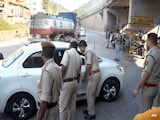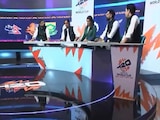- Muhammad Yunus criticised Sheikh Hasina's online speeches from India.
- He urged Prime Minister Modi to help prevent Ms Hasina from addressing Bangladeshis online.
- Mr Yunus reported an informal request for Ms Hasina's extradition to India, but no action has been taken.
Bangladesh's interim leader, Nobel Peace laureate Muhammad Yunus, issued a rebuke of former Prime Minister Sheikh Hasina's public statements from Indian soil, claiming that he personally urged Prime Minister Narendra Modi to intervene and prevent her from addressing Bangladeshis online.
In remarks delivered during an interaction at Chatham House, the Royal Institute of International Affairs in London, Mr Yunus described a volatile political atmosphere in post-Hasina Bangladesh and expressed frustration over what he suggests to be Delhi's indifference to the destabilising impact of her continued communications.
"The whole anger and everything is now transferred to India, because she went there. Not only is she living there, but the problem is, when I had a chance to talk to Prime Minister Modi, I just simply said, 'You want to host her? I cannot force you to abandon that policy, but please help us in making sure she doesn't speak to Bangladeshi people, the way she is doing'," Mr Yunus said.
According to Mr Yunus, Ms Hasina, who fled to India after being ousted by a student-led uprising in August 2024, continues to issue addresses to Bangladeshis through social media platforms, including YouTube and Facebook, often announcing these broadcasts in advance. These, Mr Yunus said, provoke public anger and risk inciting unrest in Bangladesh.
"She announces on such and such day at such and such hour, she will speak, and the whole of Bangladesh gets very angry, the way she is speaking. Why is she keeping this whole anger thing inside of us now? And is India doing what you asked? No. Mr Modi's answer, I quote, he said, 'It's the social media, we cannot control it'," Mr Yunus claimed.
"What can you say? It's an explosive situation. You can't just walk away by saying it's social media. So this is what is still going on," he added.
Diplomatic Strain
The interim leader also disclosed that an informal, unsigned diplomatic note had been submitted to Indian authorities requesting Ms Hasina's extradition. India has acknowledged receiving the document, but there has been no concrete movement so far.
"We want it to be very legal, very proper. We want to make sure that we don't do something out of anger or something. We want to build the best relationship with India. It's our neighbour. We don't want to have any kind of problem with them," Mr Yunus said.
"But somehow things go wrong every time because of all the fake news coming from the Indian press," the interim leader claimed. "And many people say it has connections with the policymakers at the top and so on. So this is what makes Bangladesh very jittery, very, very angry."
Mr Yunus added that Bangladesh's International Crimes Tribunal has initiated legal proceedings against Ms Hasina for what the tribunal described as crimes against humanity committed during her final months in power. He confirmed that notices have been served to Ms Hasina as part of a larger process that could eventually involve Interpol.
Mr Yunus claimed the barrage of disinformation on social media continues to undermine efforts to stabilise the country and recover from last year's violent uprising that unseated Hasina.
Mr Yunus, now 84, reiterated that he has no interest in joining the next elected government, nor do any members of his current cabinet of advisers.
The interim government was formed in the wake of Ms Hasina's ousting on August 5 last year, following a mass uprising led by students. Hundreds were reported killed in a brutal crackdown ordered by Ms Hasina's administration, prompting a wave of defections, resignations, and arrests. Ms Hasina's Awami League was disbanded shortly afterwards.
Mr Yunus returned from Paris to Dhaka on August 8 to take charge as the head of the interim administration. Since then, several of the student leaders have formed the National Citizen Party (NCP) with the interim government's blessing.
The interim government has initiated trials against several former Awami League leaders, both inside and outside the country. These proceedings, largely framed under "crimes against humanity" and abuses during the July-August 2024 crackdown, are ongoing at the International Crimes Tribunal.















